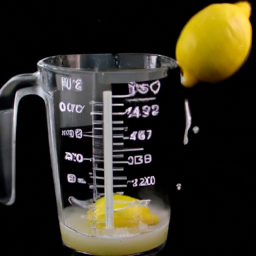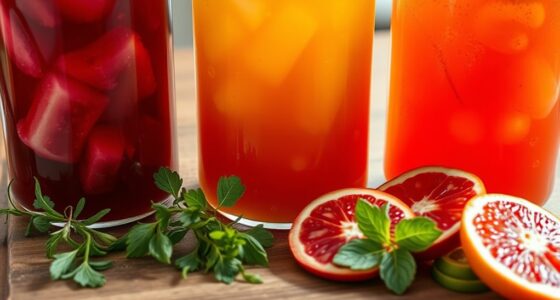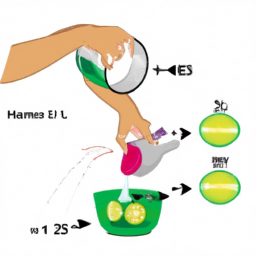As a fan of cooking and baking, I often find myself in need of lemon juice for my recipes. However, accurately measuring the amount of juice in two lemons can be tricky. The amount of juice you get from each lemon can vary based on factors such as the lemon’s size, ripeness, and freshness.
In this article, I will explore the science behind lemon juice yield, provide tips for measuring and extracting juice from lemons, and offer some delicious recipes that make use of this versatile ingredient.
When it comes to cooking with lemon juice, accuracy is key. Too little juice and your dish may lack flavor, while too much can overpower the other ingredients. That’s why it’s important to understand how much juice you can expect to get from a lemon, and how to maximize your yield.
By following the tips and techniques in this article, you’ll be able to confidently measure and extract lemon juice for your recipes, whether you’re making a tangy salad dressing, a refreshing lemonade, or a zesty marinade for grilled chicken.
So let’s get started and unravel the mystery of how much lemon juice is in two lemons!
Key Takeaways
- The amount of lemon juice in 2 lemons can vary based on their ripeness, size, and freshness.
- On average, a single lemon contains 2-3 tablespoons of juice.
- To maximize lemon juice yield, roll the lemon on a hard surface and use a citrus juicer, and strain out pulp and seeds before using the juice.
- Lemon juice can provide numerous health benefits, including aiding in digestion, boosting the immune system, and improving skin health.
Factors that Affect Lemon Juice Yield
You might be surprised to learn that the ripeness and size of your lemons can greatly impact the amount of juice you’ll get, so don’t be afraid to experiment with different varieties! Some lemon varieties are simply juicier than others, so it’s worth trying different types to find the one that works best for you.
Additionally, squeezing techniques can also make a difference. For example, rolling the lemon on a hard surface before cutting it can help release more juice. And using a citrus juicer can also be more efficient than just squeezing by hand.
It’s important to keep in mind that getting the most juice out of your lemons doesn’t necessarily mean using every last drop. Pulp and seeds can affect the taste of your dish, so it’s best to strain the juice before using it.
Now that we’ve covered the factors that affect lemon juice yield, let’s move on to how to measure lemon juice accurately.
How to Measure Lemon Juice
Hey there, wanna know the perfect way to measure the tartness of your citric fruit? When it comes to measuring lemon juice, accuracy is key.
There are different measuring tools that you can use, depending on the amount of juice you need. For small amounts, you can use a teaspoon or tablespoon. For larger amounts, you can use a measuring cup or a juicer with a measuring container.
To ensure measuring accuracy, it’s important to use the same measuring tool consistently. For example, if you use a tablespoon to measure lemon juice, use the same tablespoon every time. Also, make sure to measure the juice at eye level to avoid over or underestimating the amount.
By using the right measuring tool and following these tips, you can accurately measure the amount of lemon juice you need for your recipe.
Now that you know how to measure lemon juice accurately, let’s move on to the next question: how much juice is in a typical lemon?
How Much Juice is in a Typical Lemon?
Interestingly enough, a typical lemon doesn’t yield as much juice as you might expect. In fact, a single lemon typically contains about 2-3 tablespoons of juice. This can vary depending on the size and ripeness of the lemon, as well as the method used to extract the juice.
However, when it comes to lemon juice quality, it’s not just about quantity – the flavor and acidity level of the juice are also important factors to consider. To get the most out of your lemons, it’s important to use proper lemon juice extraction techniques.
Squeezing the lemon by hand can be effective, but using a citrus juicer can help to maximize the amount of juice extracted. Additionally, warming the lemon slightly before squeezing can help to loosen the juice and make it easier to extract.
By following these techniques, you can ensure that you are getting the most juice possible out of your lemons, without sacrificing quality or flavor.
How to Get the Most Juice Out of Your Lemons
To fully extract the tangy, zesty flavor of a lemon, it’s crucial to use proper techniques when squeezing the bright yellow fruit.
First, roll the lemon on a hard surface, applying gentle pressure to break down the cell walls and release the juice.
Next, cut the lemon in half crosswise, not lengthwise, to expose the maximum amount of juice.
Use a citrus juicer or reamer to extract the juice, or simply squeeze the lemon with your hands, using a twisting motion to get the most juice out.
There are also tools specifically designed for juicing lemons, such as handheld citrus presses or electric juicers.
These can be helpful for those who frequently use lemon juice in their cooking or drinks.
By using the proper squeezing techniques and tools, you can ensure that you get the most juice out of your lemons and maximize their flavor in your recipes.
With these tips in mind, let’s move on to the next section about tips for choosing the best lemons.
Tips for Choosing the Best Lemons
When you’re on the hunt for the perfect citrus fruit to add a burst of sunshine to your dish, look for lemons that feel heavy for their size and have a smooth skin like a polished gemstone.
There are a variety of lemon varieties to choose from, including Eureka and Meyer lemons, but regardless of the type, there are a few signs of freshness to keep in mind.
Look for lemons with bright yellow skin and avoid those with any brown spots or discoloration.
To ensure the best flavor and juiciness, consider buying organic lemons, which are free from harmful pesticides.
Additionally, try to choose lemons that have a slight give when gently squeezed, as they will be the most ripe and juicy.
By selecting the freshest lemons, you’ll be able to make the most of their tangy flavor and zesty aroma.
Now, let’s move on to how to store lemons for maximum juice yield.
How to Store Lemons for Maximum Juice Yield
Storing your citrus fruits properly can make a big difference in how much juice you can extract from them. When it comes to lemons, proper storage is key to ensuring maximum juice yield. The first step is to buy lemons that are firm and heavy for their size, as they tend to have more juice.
Once you have your lemons, store them in the refrigerator in a plastic bag to keep them fresh. Before juicing, let the lemons come to room temperature to maximize the amount of juice that can be extracted. To get the most juice out of each lemon, roll them on a hard surface before cutting them in half. Then, use a citrus juicer or a fork to extract as much juice as possible.
Proper storage and juicing techniques can help you get the most out of your lemons and ensure that you have plenty of juice for all your cooking and baking needs. When it comes to lemon juice, there are many other uses beyond just adding flavor to your dishes. From cleaning and disinfecting surfaces to creating homemade beauty treatments, lemon juice is a versatile ingredient that can be used in many ways.
Other Uses for Lemon Juice
Did you know that adding lemon juice to your water can help increase your daily water intake and improve digestion? According to a study, people who drank lemon water consumed an average of 8 more cups of water per day than those who didn’t, showing that incorporating lemon juice into your daily routine can have significant health benefits.
Here are three benefits of drinking lemon juice:
-
Lemon juice is packed with vitamin C, which can boost your immune system. A single lemon contains about 30-40 mg of vitamin C, which is about 33% of the recommended daily intake.
-
Lemon juice can aid in digestion by stimulating the production of digestive juices, which can help alleviate bloating and constipation.
-
Lemon juice can also work wonders for your skin. Its high vitamin C content can help reduce the appearance of dark spots and blemishes, while its natural acidity can help exfoliate and brighten your complexion.
In addition to its health benefits, lemon juice can also be used for skincare. Its natural acidity can act as a gentle exfoliant, while its vitamin C content can help brighten and even out your skin tone.
However, if you don’t have any lemons on hand, there are plenty of other citrus fruits and substitutes that you can use instead.
Lemon Juice Substitutes
As we’ve discussed earlier, lemon juice has several uses beyond just adding flavor to drinks and dishes. It’s a natural cleaning agent and can even be used as a skin toner. However, if you find yourself without any lemon juice on hand, there are several alternatives you could use.
One of the most popular substitutes for lemon juice is vinegar. White vinegar, apple cider vinegar, and even balsamic vinegar can all be used in place of lemon juice. Other alternatives include lime juice, citric acid, and tartaric acid. Each of these substitutes will add a slightly different flavor to your dish, so it’s important to choose one that complements the other ingredients.
When it comes to health benefits, lemon juice is packed with vitamin C, which helps boost the immune system, aids in collagen production, and can even help reduce the risk of heart disease. Lemon juice is also a natural diuretic, which means it can help flush out excess water weight and reduce bloating. While these benefits can’t be replicated exactly by lemon juice alternatives, many of them do have their own unique health properties.
Now that we’ve covered lemon juice substitutes and the health benefits of lemon juice, let’s move on to some delicious lemon juice recipes.
Lemon Juice Recipes
Get ready to tantalize your taste buds with these delicious recipes that incorporate the zesty flavor of lemon into a variety of dishes! Lemon juice is a versatile ingredient that can add a burst of flavor to sweet and savory dishes alike. But did you know that it can also be used to make refreshing lemon juice cocktails that are perfect for summer?
Here are some lemon juice recipes that you can try at home:
- Lemon and herb roasted chicken
- Lemon garlic shrimp pasta
- Lemon blueberry cheesecake bars
- Lemon vinaigrette salad dressing
- Lemonade cocktail with vodka
Not only do these recipes taste amazing, but they also offer some health benefits of lemon juice. Lemon juice is a good source of vitamin C, which can help boost your immune system and improve your skin health. It also contains antioxidants that may help reduce inflammation and prevent chronic diseases.
So go ahead and add some lemon juice to your favorite dishes and drinks for a delicious and nutritious boost!
Frequently Asked Questions
How many lemons should I use for a specific recipe?
When making a recipe that calls for lemon juice, it’s important to consider your personal taste preferences. Experiment with lemon juice substitutes or adjust the amount of lemon juice to your liking. Don’t forget to also consider the acidity level of the dish.
Can I use bottled lemon juice instead of fresh lemon juice?
I recommend using fresh lemon juice for its superior taste and nutritional benefits. However, if using bottled lemon juice, make sure it is stored properly in the refrigerator and check the expiration date.
How long does lemon juice last in the fridge?
Lemon juice lasts for about 2-3 days in the fridge. To extend its shelf life, store it in an airtight container or freeze it in ice cube trays. Bottled juice can also be used as an alternative.
Can I freeze lemon juice for later use?
Yes, you can freeze lemon juice for later use. Freezing benefits include preserving the flavor and nutrients for up to 6 months. Storage tips include using an airtight container and labeling with the date and amount.
How do I know if a lemon is ripe and ready to use for juicing?
As a lemon enthusiast, I always look for certain signs to identify ripeness and select quality for juicing. Check for a bright yellow color, slight give when squeezed, and a fragrant aroma. Don’t forget to use your senses!
Conclusion
So, how much lemon juice is in 2 lemons? The answer depends on various factors, such as the size and ripeness of the lemons, as well as the method used to extract the juice. However, on average, one lemon yields about 2-3 tablespoons of juice.
Therefore, 2 lemons may provide around 4-6 tablespoons of juice. To get the most juice out of your lemons, try using a citrus juicer or rolling the lemon on a hard surface before cutting it open. Additionally, choosing ripe lemons and storing them properly can also increase their juice yield.
Lemon juice is not only a common ingredient in cooking and baking, but it also has many health benefits and alternative uses, such as cleaning and skin care. Overall, lemons are a versatile and beneficial fruit that can add flavor and nutrition to your daily routine.
So, the next time you need some lemon juice, don’t be afraid to experiment and find the method that works best for you. And who knows, with the right technique, you might even get enough juice to fill a swimming pool (okay, maybe not that much, but you get the idea).









